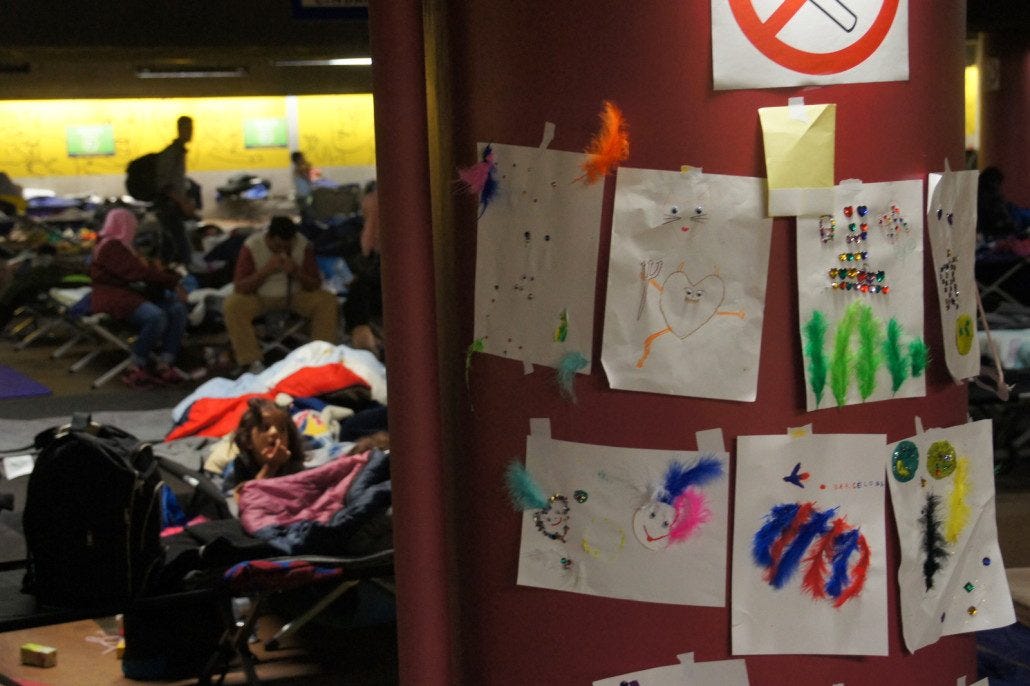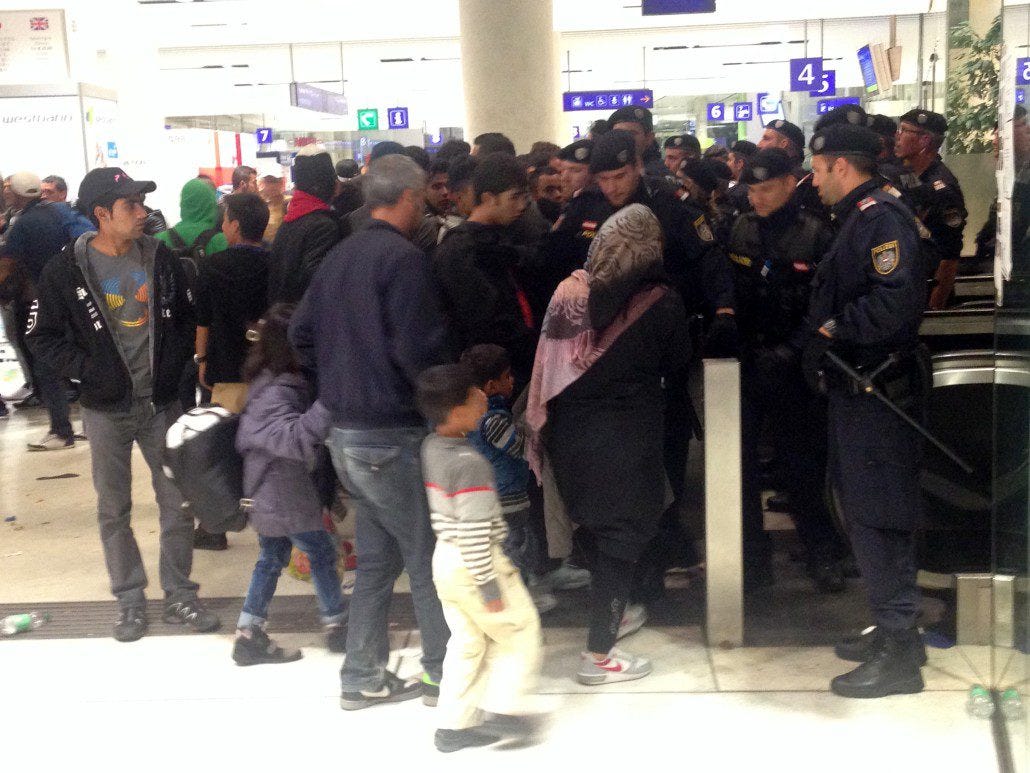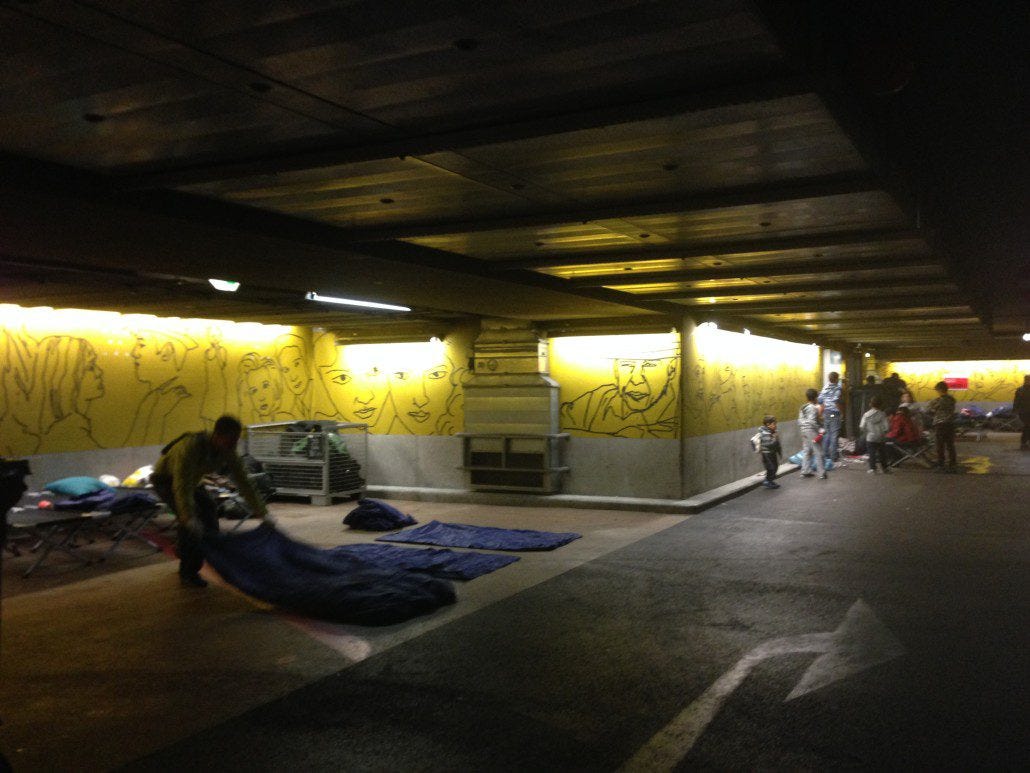What Refugees in Salzburg Taught Me About Speaking Up

During breakfast in Innsbruck, an American woman nearby leaned over to chat. Lamenting a canceled flight, she lowered her voice and said conspiratorially, “we drove down from Hamburg instead of taking the train because of, you know, all the Syrian refugees.”
I didn't counter her comment. Later, however, I couldn't stop thinking that I should have questioned the statement instead of avoiding confrontation and burying my voice.
What I didn’t say to this woman was that Chelsea and I had recently spent hours reading about the conflict in Syria. Or that we’d researched relief organizations and were heading to Salzburg with hopes of assisting the waves of refugees arriving via train from Hungary en route to Germany.
Why do people speak of others the way she did? The refugees leaving their homeland are fleeing civil war, taking only a couple bags of possessions. Meanwhile, this lady from Virginia sat next to her starched-shirt professor husband and followed up her bigoted statement with, “thank goodness the pool here is clean.”
We learned that Germany, bucking convention, may accept 800,000 refugees by the end of the year (in comparison, the U.S. may take up to 10,000 in 2016). Now, however, German services were overwhelmed and they, along with other European countries, had shut their borders, even going so far as to pause train service from Austria. Pedaling our way toward Salzburg three days later, we noticed a mile-long line of cars at the German/Austrian border as policemen checked vehicles.

Police block the entrance to the train platforms.
Cut to the scene yesterday in the Salzburg train station. Tired families rested on any surface they could find; meanwhile, police officers blocked the train platforms. Suddenly a rush of people flowed by, mothers towing wide-eyed kids, fathers shouting and herding their family through the melee. A train was departing to Germany and the wall of police politely, but firmly, allowed a small number of individual families through. One group at a time climbed the stairs to seek their fate in the west.
We talked to a volunteer named Tomas who was providing coffee and tea for people. “The refugees live on rumors; they hear a train is coming, so they run to the platform. No train. Then one comes while they’re sleeping and they miss it. There’s no rest, no ease.” He ushered us past security and into an underground parking garage, the temporary home for hundreds of refugees who slept on folding cots or the ground. As unaffiliated volunteers, Chelsea and I helped out as we could.

Blankets and donated foam sleeping pads in the garage.
I grabbed piles of thin blankets to serve as beds and laid them on the cold, dirty concrete of the parking garage. At the same time, I studied the refugee families coping with their situation. Teenagers in hip jeans flipped through their phones. Kids played with balloons or ran around, lost in their imagination; their drawings festooned a concrete pillar, a make-shift art wall. Parents mostly sat dully, perhaps storing their energy for the next rush to the train and a fresh chance to rebuild their lives.
We returned the next day. I kicked around a soccer ball with a tireless kid, then spoke at length with a few refugees. An Iranian man in his early 20s, a light and sound engineer, had applied for amnesty in the U.S. to escape persecution for being a Christian. Two years into the process, he left home and walked for days. Sick of waiting in Salzburg, he was considering striking out on foot for the German border and asked us if we thought it was possible to cross.
I also talked to a young Syrian, Muhammad, who had paid 2,000 Euros for a ship to Greece, then shelled out many bribes to navigate Serbia and Hungary. Twenty days into the journey, he aimed to make it to Belgium or England. When I commented on his red sweatshirt, emblazoned with the American stars and stripes, he said "I love America!" Then he showed me his phone's red, white and blue case. My thoughts returned to the breakfast conversation with the American woman in Innsbruck.

Laying out blankets while a family passes the time in the background.
I’ve encountered conversations like this too many times. The short (but unreal) discussion with a complete stranger in small-town Oregon who ranted about “the BLM and their damn gun-toting dykes” comes to mind. Or the man in Upstate New York who loathed gun control because he wanted to be able to shoot his cannon. Usually I slip into a friendly, aloof stance and excuse myself quickly. This latest chat, while relatively benign, reminds me that sticking up for others who are victims of hate and ignorance is necessary.
Dishonesty can wield the sword of an outright lie, but it can also fester in the silence of a truth unsaid. Not voicing an opinion can unwittingly condone actions or allow the speaker of hateful comments to believe their thoughts are held by everyone else. I’ve pondered this deeply since reading Sam Harris’s essay Lying during this trip, and Martin Luther King’s brilliant quote comes to mind: “Our lives begin to end the day we become silent about things that matter.”
Breathing the diesel fumes wafting through the underground shelter, I made a resolution. No more will I stand with a fake smile on my face while someone spouts hate or bigotry. It’s time to engage in a respectful, firm way, to tell my side of the story and share my opinion. I'm sure the experience won’t always be comfortable, but I’m hopeful that Oscar Wilde was correct when he penned, “There comes a time when speaking one’s mind ceases to be a moral duty, it becomes a pleasure.”
--
A big thanks to our dear friend Hilary Wang for inspiring us to get involved with this issue. If anyone would like to contribute to help the refugees, The UN Refugee Agency (UNHCR) is helping some of the four million people fleeing Syria; until October 13th, Kickstarter is (for the first time) helping fund raise as well. Google is currently matching contributions up to $5.5 million to UNHCR and other organizations.
